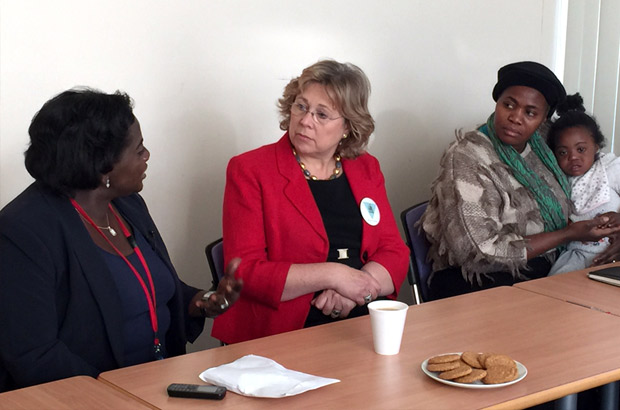Yesterday I returned to a hospital where I worked many years ago. I used to gaze across the Thames from the window at St Thomas’ to the Houses of Parliament, not knowing they would have much direct relevance to me. More particularly, I used to watch the barges plying up and down the river. What was never on my mind, because I did not know about it, was female genital mutilation (FGM). But now I do. And that owes much to those whom I met today, and to those who have battled on this cause for years, to rid the world of FGM within a generation.
One of those women is Comfort Momoh, an FGM Consultant and Public Health Specialist who back in 1997 established the African Well Woman’s Clinic at Guy’s and St Thomas’. Today this is the busiest FGM clinic in the UK, seeing up to 400 women a year, undertaking reversals, delivering infants, and advising other clinics round the country. Comfort is still at the helm – and as she explained, to many women her very name was a reassurance to them. It seemed right that on my first FGM visit as International Development Minister, it was to Comfort and her clinic that I should go.
There I met the dedicated team working with those who have undergone FGM. And survivors – determined not to be silent, not to be victims, but to campaign for change. As we seek to end FGM in a generation, how appropriate that one survivor brought along her little daughter, a cheerful little thing who was torn between grabbing for a biscuit and grabbing for my Girl Generation badge, but above all totally innocent of what her mother was determined she should never endure.

As people are now increasingly recognising, FGM is an extremely harmful practice that can cause lifelong physical side-effects, making natural events like going to the toilet or giving birth excruciatingly painful and prolonged experiences. Terrible medical complications can arise, either at the time, years later during childbirth, or constantly, wearing a woman down. I was encouraged that some of the physical effects of FGM can be reversed by clinics like Comfort’s as an outpatient procedure in just 15 minutes. But I fully recognise that the psychological trauma cannot be erased so easily.
Meeting survivors today, it is clear that every woman’s story of FGM may be different. Even where the cultural heritage is similar, how the original act came about, her age at the time, the trauma she went through, her parents’ reasons or reaction later in life to the problems it caused, created different experiences. But where they spoke as one was in their determination not to let FGM destroy their lives, or for the practice to continue.
And that is why we, the Coalition government, want to encourage more people to speak out about FGM to bring what has long been a hidden crime out into the open. My predecessor, Lynne Featherstone, had done so much, with others, to shine a light on this area. And she continues her work in the Home Office. Across government, action is being taken. Since April, NHS staff must now report in patient healthcare records whenever it is found that a patient has had FGM. These data are vital not only for enabling us to know the number of women affected, but also so that they can receive appropriate care.
We also believe that introducing a new mandatory reporting duty will help to increase the numbers of police investigations into FGM, helping to deter perpetrators and in turn preventing this from happening in the first place. Of course this is a complex area and will affect many frontline staff like the people I met today. It was therefore good to hear their thoughts on how best to introduce mandatory reporting in a way which is sensitive and successful, opinions I know they will be contributing to the current Home Office consultation.
On Friday I attended the very moving funeral service of Efua Dorkenoo, whose life was devoted to the eradication of FGM. I am sure her spirit lives on in those who will continue this battle, to eradicate FGM within a generation. And we will campaign with them. Because once you know about FGM, you can do no other.
Sign up for email updates from this blog, or follow Lindsay on Twitter.

1 comment
Comment by Anita Ford posted on
This violence against women and girls is so sad. I am happy to see that there are people who cares about the situation!